Cupping
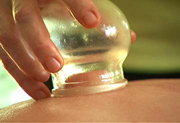 In addition to acupuncture and herbology, cupping therapy has been part of Chinese medicine for over 2,500 years. But it’s become hugely popular after Michael Phelps was shown with the typical cup marks on his body during the Rio Olympics. Originally, animal horn was used for cupping, later on brass, ceramic, and bamboo cups were used. Today, we use glass cups in a variety of different sizes.
In addition to acupuncture and herbology, cupping therapy has been part of Chinese medicine for over 2,500 years. But it’s become hugely popular after Michael Phelps was shown with the typical cup marks on his body during the Rio Olympics. Originally, animal horn was used for cupping, later on brass, ceramic, and bamboo cups were used. Today, we use glass cups in a variety of different sizes.
Cupping is like a very deep tissue massage. The practitioner applies heat in a cup and then applies that cup to the body, most commonly on the back. The heat creates a vacuum effect and draws the skin up into the cup. The result is a movement of fresh blood to the area, release of toxins, acupuncture point stimulation, increased circulation of blood and lymph, relaxation of tight muscles, and reduced inflammation.
Cupping does leave noticeable marks similar to a bruise or hickey that is sometimes referred to as “cup kisses”. Although they can look alarming, they are not painful and will disappear on their own within 3-7 days.
Most commonly, it’s used for aches and pains of various types including low back and leg pain, neck and shoulder tension, and fibromyalgia. It also helps open up the chest and benefits the lungs to treat respiratory problems such as cough, bronchitis, asthma, and the like. It and can even benefitmenstrual problems and digestive problems including stomach aches, vomiting, and diarrhea.
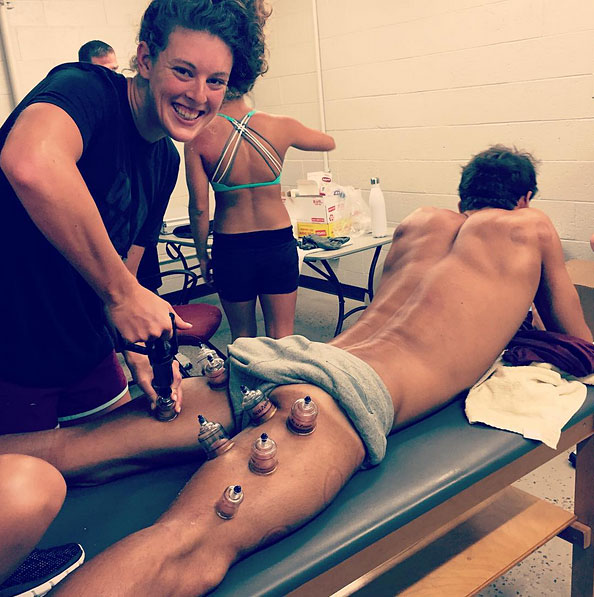
Schedule an appointment with a Miami licensed acupuncturist to experience this ancient healing modality first hand.
Acupressure
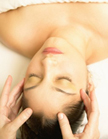 Acupressure is a branch of traditional Chinese medicine which involves the stimulation of acupuncture points with finger pressure using the power and sensitivity of human touch, rather than inserting needles. This form of healing is non-invasive and gentle. The indications include the vast array of conditions that Chinese medicine has proven to treat effectively. Because acupressure stimulates the body’s natural self-healing abilities, it also works as a great preventative therapy. Generally, the effects of acupressure are less potent than those of acupuncture, and as a result more treatments are needed to get the same results.
Acupressure is a branch of traditional Chinese medicine which involves the stimulation of acupuncture points with finger pressure using the power and sensitivity of human touch, rather than inserting needles. This form of healing is non-invasive and gentle. The indications include the vast array of conditions that Chinese medicine has proven to treat effectively. Because acupressure stimulates the body’s natural self-healing abilities, it also works as a great preventative therapy. Generally, the effects of acupressure are less potent than those of acupuncture, and as a result more treatments are needed to get the same results.
Acupressure is ideal for children. It is gentle, safe, and effective for many conditions, including relief and prevention of colds and flu. Parents can also be taught self-help techniques to use on their child at home.
Acupressure is also suitable for the elderly suffering from conditions including sciatica, arthritis, mobility problems, constipation, and poor circulation.
Certain acupressure points must be avoided during pregnancy. Be sure to tell your practitioner if you are or may be pregnant.
Moxibustion
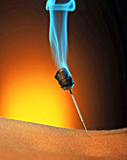 Moxibustion evolved thousands of years ago in early northern China. It is part of traditional Chinese medical practices and came about at the same time as acupuncture.
Moxibustion evolved thousands of years ago in early northern China. It is part of traditional Chinese medical practices and came about at the same time as acupuncture.
Moxibustion involves the burning of moxa, an herbal wool made from the leaves of the Mugwort plant, over specific acupoints. The moxa is often formed it into a small cone and placed on the tip of a needle or rolled into a cigar-like shape and passed over the skin in wave-like motions. The radiant heat produced by moxibustion penetrates deeply into the body to restore balance, promote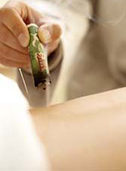 circulation, and reduce pain. This form of treatment, usually combined with acupuncture, is indicated for improving general health and treating chronic conditions such as arthritis, digestive disorders, pain, infertility, ulcers, and many other ailments.
circulation, and reduce pain. This form of treatment, usually combined with acupuncture, is indicated for improving general health and treating chronic conditions such as arthritis, digestive disorders, pain, infertility, ulcers, and many other ailments.
Many times the practitioner will send the patient home with a moxa stick so that it can be applied regularly between treatments. The burning of moxa will produce a potent smoke. For people who have asthma or respiratory problems, smokeless moxa can be used.
Nutritional Therapy
 Nutrition is a very important element of the complete Traditional Chinese Medicine system. It is one of both healing and disease prevention. Many diseases and symptoms can be treated with dietary changes alone; however it often takes longer and requires the utmost compliance and dedication on the patient’s behalf. Unfortunately, today’s population has a poor concept of what constitutes a good diet. The fast paced lifestyle often gives nutritious eating a low priority. At the same time, mind-boggling numbers of different diet fads and controversial dietary regimes add even more confusion to modern day eating habits. As a result, we see deterioration in the quality of people’s lives in the form of obesity, depression, diabetes, cardiovascular disease, arthritis, etc.
Nutrition is a very important element of the complete Traditional Chinese Medicine system. It is one of both healing and disease prevention. Many diseases and symptoms can be treated with dietary changes alone; however it often takes longer and requires the utmost compliance and dedication on the patient’s behalf. Unfortunately, today’s population has a poor concept of what constitutes a good diet. The fast paced lifestyle often gives nutritious eating a low priority. At the same time, mind-boggling numbers of different diet fads and controversial dietary regimes add even more confusion to modern day eating habits. As a result, we see deterioration in the quality of people’s lives in the form of obesity, depression, diabetes, cardiovascular disease, arthritis, etc.
Chinese nutrition uniquely differs from modern Western nutrition in that it determines the energies and therapeutic properties of foods instead of analyzing the chemical constituents of them. The advantage of this approach lies in its ability to customize to every individual’s needs. Furthermore, Chinese nutrition takes into consideration such factors as method of preparation, body type, season, and one’s geographical location in determining the appropriate diet. Schedule an appointment for a nutritional consultation today and begin your healing journey with your next meal.
Auricular (Ear) Acupuncture
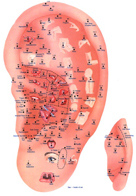 Auricular acupuncture involves the stimulation of the acupoints located on the ear with tiny seeds or pellets. The seeds are no larger than the tip of an unsharpened pencil, do not pierce the skin, and are painless when affixed. The client will leave these seeds in for up to 1 week and re-stimulate the points by massaging the ear several times each day.
Auricular acupuncture involves the stimulation of the acupoints located on the ear with tiny seeds or pellets. The seeds are no larger than the tip of an unsharpened pencil, do not pierce the skin, and are painless when affixed. The client will leave these seeds in for up to 1 week and re-stimulate the points by massaging the ear several times each day.
There are over 200 acupoints on each ear that represent the anatomical parts and functions of the human body. These points are arranged on the ear in the image of an inverted fetus. By observing points of tenderness, coloration changes, protrusions or depressions, and skin variations, a trained practitioner can not only treat a wide range of diseases using only the ear, but can diagnose them as well. When we stimulate these points we access the central nervous system through the cranial nerves on the auricle of the ear. This sends a direct message to the brain that results in a healing response.
This therapy is most often used for addiction, smoking cessation, and weight loss.
Do you want to know if your insurance covers acupuncture? Just click on the insurance logos below and we’ll check for you and let you know.

If you have any questions, please send us an e-mail or call us at (305) 306-4150. We will be happy to answer your questions and discuss your concerns.
